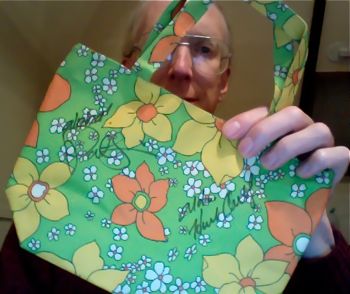Ms. M and Oz let us know that they were going to hear slack-key guitarist Patrick Landeza play Hawai’ian Christmas music at the San Leandro Public Library, and would we like to meet them there? I found out that Herb Ohta Jr. would be playing too — Herb Ohta Jr., son of Ohta-san himself and one of the best ‘ukulelists alive! — and told Carol that we had to go.
We arrived in time to eat the Hawai’ian dinner plate (rice, chicken teriyaki, macaroni salad, but no spam). The hall was filling up, and it was a nice crowd — older people, middle-aged people, young parents, kids. Haoles were definitely a minority. By the time Ms. M and Oz showed up, there were some two hundred people in the hall and we could not find seats together.
Carol entered us in the raffle, and before the music started Patrick Landeza raffled off several items. A young girl got a bag for wine bottles. Next to be raffled off was a little bag with a bright floral pattern, obviously perfect for a young girl. Landeza joked that it was a “man purse,” then started laughing when he pulled out the name: “It’s going to a man: Dan Harper!” I went up and claimed my little floral purse. And against all odds, Carol also won something in the raffle: a little Hawai’ian wreath for a Christmas tree ornament.
The music was perfect Christmas music — what could be better than traditional Hawai’ian songs at Christmas time? What could be better than hearing a master like Herb Ohta Jr. play “Rudolph the Red-Nosed Reindeer” on the ‘ukulele? What could be better than hearing “Silent Night” sung in Hawai’ian, and interpreted by a hula dancer? And to top it all off, I got my man purse signed by Patrick Landeza and Herb Ohta Jr.:

